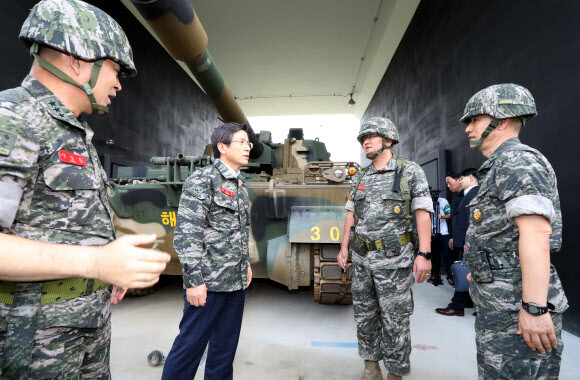hankyoreh
Links to other country sites 다른 나라 사이트 링크
South Korea announces “Massive Punishment and Retaliation” in response to fifth nuke test

The South Korean military has announced the “Korea Massive Punishment and Retaliation” plan, or KMPR, as a military response to North Korea’s fifth nuclear test. There are doubts about how effective a deterrent this would be against North Korea’s nuclear program, however.
“The concept envisions responding to damage caused by a North Korean nuclear weapon by targeting the North Korean leadership, including its military headquarters, in a punitive and retaliatory strike,” said Lim Ho-yeong, chief of strategy and planning for South Korea’s Joint Chiefs of Staff. Lim made the comments on Sep. 9 while he was explaining the plan to reporters. The plan would involve teams of highly trained commandos and simultaneous attacks with large numbers of missiles capable of precision strikes.
Since the attack outlined by this plan would be carried out if “signs” of a North Korean nuclear attack are detected, it represents a preemptive strike. The retaliation plan was described as being part of a three-pronged system of deterrence against North Korea along with the kill chain (a defensive system involving a preemptive strike by the US-ROK Joint Command) and the Korea Air and Missile Defense (KAMD).
According to the plan, South Korea would respond to indications that North Korea was going to use a nuclear weapon by dispatching units of special forces and simultaneously firing weapons including the Hyunmoo-2 ballistic missile and the Hyunmoo-3 cruise missile to obliterate areas where Kim Jong-un and the rest of North Korea’s leaders are located.
“This is the first time that the military has officially mentioned a ‘massive punishment and retaliation’ plan. Previous operational concepts have been largely defensive, but this one can be regarded as having some aggressive elements,” said Yang-uk, a senior analyst for the Korea Defense and Security Forum, on Sep. 11.
“In order for this operational concept to be effective, a joint special forces command would need to be set up linking the army, navy, and air force instead of just having a special forces command in the army. We would also need to compensate for our reliance on the US for the strategic assets that we use in battle.”
Some experts believe that this operational concept is much the same as the “decapitation strike” that created an uproar when it was mentioned by a South Korean military official last year. The concept could also provoke an emotional response from North Korea, increasing inter-Korean military tensions.
“Targeting the North Korean leadership is intended to make clear the South Korean military’s resolve while simultaneously alleviating the concerns of the public. Emotional bickering can create a positive feedback loop that can ratchet up military tensions,” said Shin In-gyun, director of the Korea Defense Network
“Looking at the balance of fear, though, you couldn’t say that this raises the actual chances of a clash,” Shin said.
Critics also suggest that there are flaws in the design of the operational concept.
“The concept of ‘massive punishment and retaliation’ is nothing new – it dates back to the days when Eisenhower was US president. But with the ‘Korea Massive Punishment and Retaliation’ concept, the object of massive punishment conflicts with the target of the leadership. If the ultimate goal is to punish the leadership, the focus should be placed not on ‘massive’ but rather on ‘accuracy’ or ‘precision,’” said Justice Party lawmaker Kim Jong-dae, who is a military expert.
“Considering that the South Korean military can’t even figure out what’s going on with North Korea’s nuclear weapons, it’s doubtful that they could determine the location of the North Korean leaders and carry out the operation during an actual crisis,” Kim said.
By Ha Eo-young, staff reporter
Please direct questions or comments to [english@hani.co.kr]

Editorial・opinion
![[Editorial] Does Yoon think the Korean public is wrong? [Editorial] Does Yoon think the Korean public is wrong?](https://flexible.img.hani.co.kr/flexible/normal/500/300/imgdb/original/2024/0417/8517133419684774.jpg) [Editorial] Does Yoon think the Korean public is wrong?
[Editorial] Does Yoon think the Korean public is wrong?![[Editorial] As it bolsters its alliance with US, Japan must be accountable for past [Editorial] As it bolsters its alliance with US, Japan must be accountable for past](https://flexible.img.hani.co.kr/flexible/normal/500/300/imgdb/original/2024/0417/6817133413968321.jpg) [Editorial] As it bolsters its alliance with US, Japan must be accountable for past
[Editorial] As it bolsters its alliance with US, Japan must be accountable for past- [Guest essay] Amending the Constitution is Yoon’s key to leaving office in public’s good graces
- [Editorial] 10 years on, lessons of Sewol tragedy must never be forgotten
- [Column] A death blow to Korea’s prosecutor politics
- [Correspondent’s column] The US and the end of Japanese pacifism
- [Guest essay] How Korea turned its trainee doctors into monsters
- [Guest essay] As someone who helped forge Seoul-Moscow ties, their status today troubles me
- [Editorial] Koreans sent a loud and clear message to Yoon
- [Column] In Korea’s midterm elections, it’s time for accountability
Most viewed articles
- 1[Column] The clock is ticking for Korea’s first lady
- 2[Editorial] When the choice is kids or career, Korea will never overcome birth rate woes
- 3S. Korea, Japan reaffirm commitment to strengthening trilateral ties with US
- 4Korea, Japan jointly vow response to FX volatility as currencies tumble
- 5[Guest essay] How Korea turned its trainee doctors into monsters
- 6Japan officially says compensation of Korean forced laborers isn’t its responsibility
- 7US exploring options for monitoring N. Korean sanctions beyond UN, says envoy
- 8Gangnam murderer says he killed “because women have always ignored me”
- 9[Editorial] As it bolsters its alliance with US, Japan must be accountable for past
- 10‘Right direction’: After judgment day from voters, Yoon shrugs off calls for change